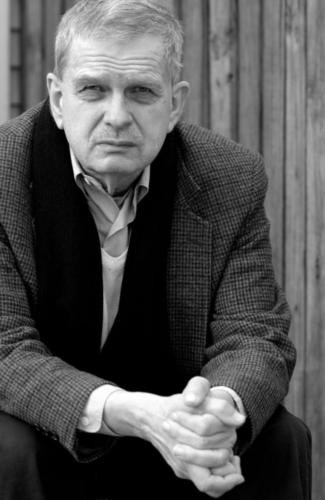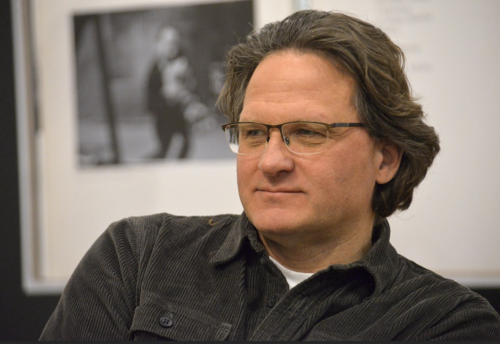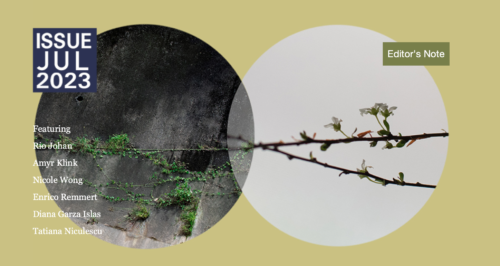I To recognize the unwelcoming places where you grewup in another land before the last century was through:a fruitless stretch of dunes, willows, a warehouse wallby the shore will hardly recall who lived here at all.The lonely rushed through these streets with a taxi and threecarriages, while orangeade dripped on park paths. At three-thirty,German girls gathered on the other side of the tracks,saying Süsses Kind over the strollers along their path.They yearned for the empire’s signs, walked the yellowsand, and applauded the shadow on the balcony in the oldtown, until their hairdos, hats, and rings were sunkin bland waters by Marinescu in his victorious sub. II There is more to the landscape: importantly—the skyand the piercing waves that gaze right into its eye,smokestacks, stork-nest poles, willows sparselyscattered along the lower banks of the canal,the stink of flatfish, the wind rocking a shabbyyacht by the bridge. I see the teacher, holding his key,returning from the Red Cross for a nap—he gazes joylessly over his temporary flat:laundry hung to dry in the garret, shutters knocking,plaster peeling (onto the cradle?), bookshelves leaningfrom Marxist tomes, and beyond the Danė river, he sees,like a monotonous echo, timber frame homes recede. III The clatter of hooves—spoons and faience ring in answer.The eye can spot a low Anglican church by the harbor.Its roof is like the cover of an earthenware jar.Nothing further. Europe’s threshold or boundary—these flat shores, these swamps, fertilized equallyby the bones of Skalvians, Old Prussians, Vistula Veneti.Catalogues of the past: nach Osten, Westen, one flees—ships are sunk, the implacable weight of the seapresses mustard gas drums. An irresistible current:its echo bursts repeatedly on the desolate grassy fort.And so the limpid reflection below a frozen skiff gleamsin morning cold, clearer than the skiff itself, it seems— IV so deep, like a voice hardly recognized in a dreambut which, in repeating a pointless sound, can meanmore than the people to whom one speaks. A nymph,un-sleeping Echo, reigns over the world that is left.Above the vanished city of my birth, from Bothnianskerries to Skagerrak, from the fuming EasternCape to Spit’s End, a clear rhythm, as from a trumpet,sails out beyond us, announcing the Last Judgment:it will wake us in the dark, lead us home from imprisonment,so that we might be thankful for everything—even whentime erases all shape and gesture, like an experiencedcensor, from the sheet of paper, the photo, and the text.
Prehistory
Feature Date
- November 21, 2023
Series
- Translation
Selected By
Share This Poem
Print This Poem
English Copyright © 2023 by Rimas Uzgiris.
All rights reserved.
Reproduced by Poetry Daily with permission.

Tomas Venclova was born in Klaipėda, Lithuania, in 1937, and graduated from Vilnius University. He is a scholar, poet, and translator of literature. Venclova was a founding member of the Lithuanian Helsinki Group, which monitored Soviet violations of human rights. Threatened with sanctions, he emigrated in 1977. He received a PhD from Yale University in 1985. Collections of his poems have been published in English as Winter Dialogue (Northwestern University Press, 1999) and The Junction: Selected Poems (Bloodaxe Books, 2008). A new selection of his poems is in the works. Venclova has been the recipient of numerous awards, including the Lithuanian National Prize in 2000, the Yotvingian Prize in 2005, the Poetry Spring Maironis Prize in 2017, and the 2002 Prize of Two Nations, which he received jointly with Czesław Miłosz. He is professor emeritus at Yale University and now lives full time in Vilnius.

Rimas Uzgiris is a Lithuanian poet and translator writing in English. Born and raised in the United States, educated at UCSD, UW-Madison, Rutgers-Newark, he is the author of the poetry collections North of Paradise (Kelsay Books, 2019), and Tarp(Between; Kauko laiptai, 2019), a book of poems translated into Lithuanian, which was shortlisted for best poetry book of the year. He has translated seven poetry collections from Lithuanian, including Then What by Gintaras Grajauskas (Bloodaxe Books, 2018) and Vagabond Sun by Judita Vaičiūnaitė (Shearsman Books, 2018). He also translated the opera Sun & Sea, which won the Golden Lion at the 2019 Venice Biennale. His poetry has appeared in Barrow Street, Hudson Review, Poetry Daily, The Poetry Review, and other journals. Recipient of a Fulbright Scholar Grant and an NEA Translation Fellowship, he teaches at Vilnius University.

July 2023
Taipei City
Editor-in-Chief
Lee Yew Leong
Assistant Managing Editors
Daljinder Johal
Malak Khalil
Marina Martino
Samuel Miller
Janet Phillips
Lindsay Semel
Poetry Editor
Lee Yew Leong
Winner of the 2015 London Book Fair’s International Literary Translation Initiative Award, Asymptote is the premier site for world literature in translation. We take our name from the dotted line on a graph that a mathematical function may tend toward, but never reach. Similarly, a translated text may never fully replicate the effect of the original; it is its own creative act.
Our mission is simple: to unlock the literary treasures of the world. To date, our magazine has featured work from 105 countries and 84 languages, all never-before-published poetry, fiction, nonfiction, drama, and interviews by writers and translators such as J. M. Coetzee, Patrick Modiano, Herta Müller, Can Xue, Junot Díaz, Ismail Kadare, David Mitchell, Anne Carson, Haruki Murakami, Lydia Davis, Ann Goldstein, and Deborah Smith.
Poetry Daily Depends on You
With your support, we make reading the best contemporary poetry a treasured daily experience. Consider a contribution today.



